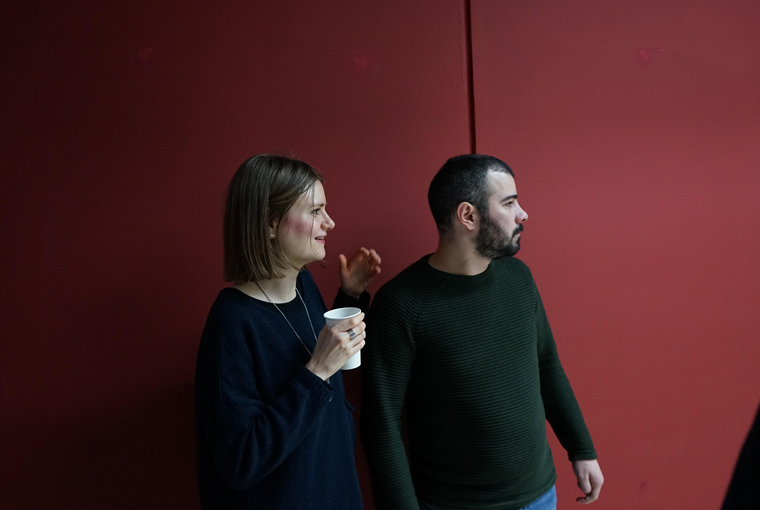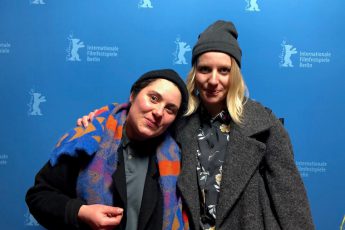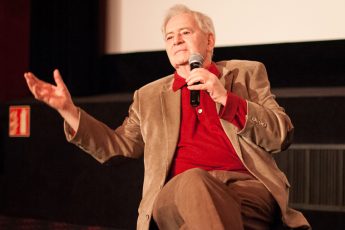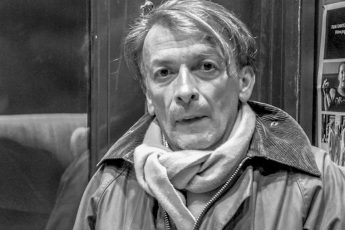
Theater director, actor and now filmmaker, Eugen Jebeleanu (pictured above alongside screenwriter Ioana Moraru) talked to EEFB from his hometown of Timișoara, where he is currently presenting a new version of the Rainer Werner Fassbinder play “Katzelmacher”. We talked about the making of his latest film, the LGBT community and their relation to the police in Romania, and his influences and hopes for the future of Romanian cinema.
The script for your film Poppy Field was written by Ioana Moraru. What did you like about it when you first read it?
It happened like this: one day I received a phone call from the producer of the film. She asked me to read the screenplay to see if I was interested in directing it. This doesn’t happen that often, at least not in Romania, so I was really happy – especially because I had never made a film before, not even a short. First and foremost, I was interested in the story, which was based on a real event: one day a group of Orthodox people came into the cinema hall to interrupt the screening of an LGBT film. This first happened in 2013, and then again years later. I’m very interested in the topic of LGBT stories and characters, because I think they are not shown often enough in Romania. I’m an artist who is completely comfortable with who I am: a homosexual person. I also wanted to do something for my community in this locality. I found that the script was well-written, and I liked the way it dealt with someone coming from a completely different world: a policeman. It portrays the struggle between his personal and professional identities and all the homophobia and hate and fear that is inside him. That’s why I said yes.
Did you work with cops in order to make the film? Were any of the actors cops?
No, not at all. But we had a policeman who consulted us. He came to our rehearsals from time to time. Ioana and I asked him a lot of questions, for instance whether there were any gay colleagues in his team.
Were there?
He was sure that he had some gay colleagues, but it’s not talked about. I think Ioana wanted to keep this idea of a story about a cop. You might know, but it’s so taboo that you don’t talk about it. It’s a bit awkward. It would have been easier if we had had an open door to policemen, but this is impossible in Romania. This institution is not so easy to have a discussion about.
Were there any echoes of the Black Lives Matter movement in Romania?
Yes. On the 10th of August 2018, there was a big demonstration where people were out in the street to protest the government and corruption. It was a very angry protest where the police were meeting the protestors with a lot of violence. It was a huge topic in Romania, but it wasn’t really discussed openly. The story of what happened has not been totally resolved until today. I think there is still a lot of police violence, but it’s not talked about and people are afraid of that.
Why do the police ask for everyone’s ID, protestors and audience included, when they enter the cinema hall in your film?
People shot these protests with their phones and if you look at the real scenes which took place during the protests in cinema halls, you’ll see that the police were always saying the same thing, that they wanted to see the identity card of the people present in order to give them a fine.
To everyone?
To the people who were causing a ruckus: those who were making too much noise or getting in the way. It’s a way to scare people. But from my perspective it’s also a way of not doing their jobs. Just asking for people’s identity card is a way to show off. Just after I came back from Kyiv to Romania, the European Court of Human Rights announced that Romania now has to pay a fine because of what happened in 2013, because it was a human rights case and yet the police did nothing. They decided that from now in an event where a homophobic act is taking place, the police are obliged to take the side of the people who are being attacked. It’s a big step. I think at that moment they were so ignorant about this subject, that they just came there and it was like, “Let’s just tell people to leave”.
What was it like making your first film? Was it very different to directing a play?
It was very similar in some ways because I didn’t change how I worked with actors. What I do in theater is to make actors be very honest. I let them speak from their own experience rather than having them create a part for themselves. It’s more about vulnerability and honesty. What changed is the fact that in theater the set-up is more frontal. Now I had all this space around. The DoP (Marius Panduru) told me that I shouldn’t forget I am not in the theater, that the audience is all around. It changed my way of working a lot. It also changed with the production itself because there were so many people involved. I felt very protected. More than in theatrical productions, where you sometimes feel like you are alone.
Would you want to make more films?
I’d love to. I’d like to work with the same production company and screenwriter again. At the moment we’re waiting for the funds. I’m the kind of artist who likes to try out more mediums like this. I’d like to bring more cinema into the theater and more theater into the cinema, I love things that are multidisciplinary.
Which Romanian filmmakers do you particularly like?
Today, I think the most politically necessary and courageous filmmaker in Romania is Radu Jude. Even though it’s completely different from what I do, I really like his way of thinking and making films. Also, of course all the cinematographers and directors from the New Wave are important and doing a lot for cinema. In my opinion, one of the best films is The Death of Mr. Lazarescu. I would love to see more women, young people, and more artists like me that are coming from other disciplines and not just ones that make scholarly films.
Thank you for the interview.




Leave a Comment